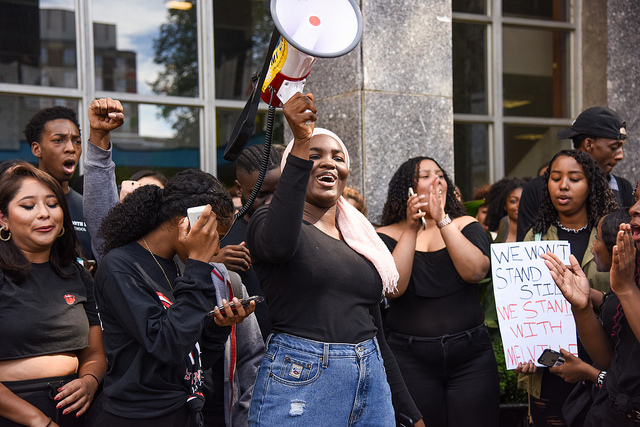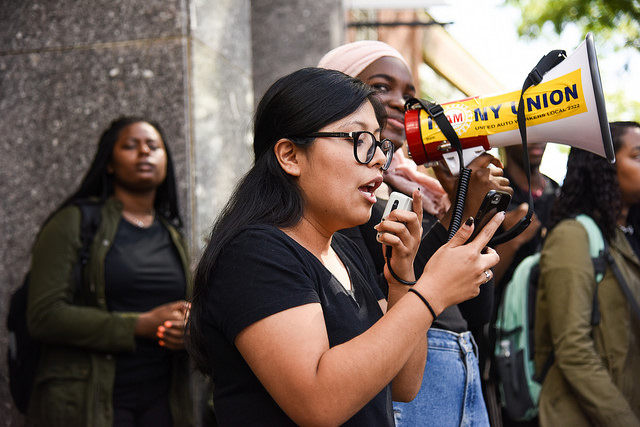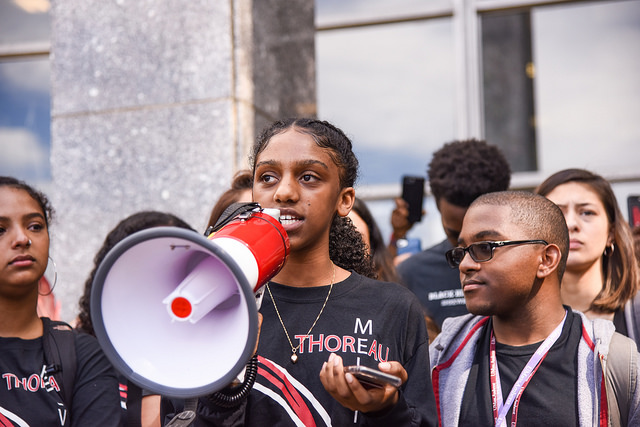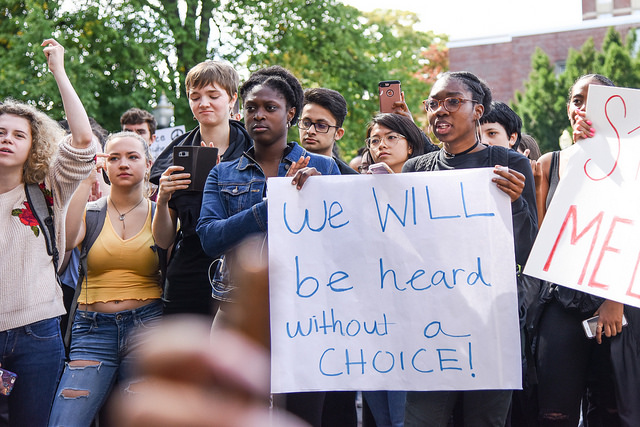Hundreds of students from the University of Massachusetts marched from the Whitmore Administration building to the Student Union on Sept. 27 to spread awareness of the racist incident that occurred in Melville Hall.
Last Saturday, the message “Hang Melville n******” was written on a bathroom mirror in the lobby of Melville Hall in Southwest Residential Area, prompting the University to hold a meeting in the residence hall responding to the incident. Many students from several cultural organizations have pressured UMass to take further action.
Earlier in September, an anonymous call to police about claims of an “agitated Black male” was made, but it turned out to be a University employee who had been walking to work.
“There have been several racial incidents—hate crimes—against people of color on campus,” said Nuha Futa, president of UMass Amnesty International. “We don’t feel like it’s been getting enough awareness or enough action from the administration, so we are all calling together on campus to march to bring awareness to those who may have not known and to let the administration know that we’re serious about this.”
Around 12:30 p.m. a large group of students led by Futa and Co-President of UMass Amnesty Ivis Batista began marching from Whitmore to the Student Union. Many of the students wore black and several carried signs reading, “Stand with Melville,” “We will be heard without a choice” and “Accountability is only the first step.” As the crowd marched toward the Student Union, people chanted “We won’t stand still, we stand with Melville” and “UMass face it, it was racist.”

At the Student Union, Batista spoke in front of hundreds of marchers to call for more administrative action.
“Today we speak about how important it is for this University to make this campus a safe place for everyone,” Batista said. “We will no longer allow for the administration to send their thoughts and apologies with no action.”
“Accountability is not only about what you will do, it’s also about what you do not do,” she said, speaking specifically about the University-wide email about the racial profiling incident sent out on September 16 titled “Campus Incident and a Cause for Reflection,” which she said was “invalidating” to the experiences of students of color by using euphemisms to describe the incident.
Ana Dolan, a resident assistant on the third floor of Melville Hall, spoke about how the incident affected her and her residents.
“[This incident] has affected students across this campus. These hateful words were a direct threat to people’s lives. As a result of this person’s actions, students across campus are living in fear. Residents in my building have come to me saying ‘I can’t sleep at night,’ ‘I can’t walk around this campus by myself,’ ‘I don’t feel safe anywhere.’”

Dolan also criticized a campus-wide email sent out by the administration after Reginald Andrade, an African-American employee of the University, had the police called on him while he was walking to work. In the email, the University calls for “everyone’s participation in this most important undertaking.”
“My question is ‘Where is the University’s participation and acknowledgement of this incident?’ This University has yet to publicly and directly address this issue, by taking this approach the University sends one message: ‘this issue isn’t important enough,’” Dolan said.
Kiara Batista, a freshman resident of Melville Hall, spoke about her experience since the incident, as her floor mates stood beside her.
“I have to walk on this campus with a guard up now, because it is hard to trust anyone I come by. I don’t like living this way and I don’t think anyone here agrees that anyone should live this way. However, despite all the horrible things that have happened, the incident and the way the University is handling this… I am optimistic.”

“As a member of this community I would like to feel at home again in my own home, to truly be safe in this place that this University calls home. If I truly matter at UMass, this has to be done,” she said. “They keep telling us that Melville is our home and that we’re going to be safe, but you know we’re the ones that have to live there and it doesn’t feel safe, so all I want is for it to be safe again.”
Batista then reminded everyone at the protest to attend the Student Government Association forum at 5:30 p.m. Thursday in Bartlett Hall where the UMass Police Department will be discussing the recent incidents of racism with students.
Later on, Thursday afternoon, the Chancellor’s office sent a campus-wide email titled “United Against Acts of Hate.” The email said the racist incident is “being thoroughly investigated by UMPD,” and that the University is “fully committed to ensuring a safe and welcoming environment for every member of our campus community.”
The email invited the community to attend a discussion called “The Problem of the Color Line: A Discussion of Racism and Racial Profiling on Campus” on October 2 at 5 p.m. in the Cape Cod Lounge.
Alvin Buyinza can be reached at [email protected] and followed on twitter at abuyinza_news.





















Amy • Sep 30, 2018 at 8:00 pm
I thought Enku was Indian; one of the chancellors is also african-american. Umass goes out of it’s way to accommodate black students and while that’s great; I think the inequality Umass applies to one minority versus others is obvious.
Milonhingmang • Oct 11, 2022 at 8:44 am
I think (last Saturday) the message “hang Melville…
Ed Cutting, Ed.D. • Sep 28, 2018 at 1:51 am
First & foremost, what ever happened to the ban on bullhorns?
Seriously, that was a content-neutral ban enacted because, well, I had one….
.
Second, this isn’t Selma, Alabama, circa 1963!!! Any Black student who doesn’t feel safe walking across campus needs mental health counseling — and they have Black counselors over there…
.
UMass also has Black cops, not to mention Black administrators — Enku Gelaye was born in Somalia.. Seriously, the top Student Affairs person is not only Black but was born in Somalia…
.
While it’s OK to be upset about boorish stuff written in a bathroom, there ought to be some sense of proportionality to the response. It isn’t like the Chancellor wrote it (or at least I hope he didn’t….).
Amy • Sep 27, 2018 at 7:25 pm
I would like to provide a critical opinion and I wasn’t going to because I was harassed by commenters on the daily collegian news article on the bathroom wall, which included attacking my race(asian), my gender(female), saying I should be aborted and making comments about how would it feel if someone wrote, white people should be hanged. All because I had a critical viewpoint.
I am not going to be bullied. So I will provide a critical opinion. First the university did an excellent job responding; in fact I would argue it responded far too aggressively. These students complaining should be grateful. There have been many incidents of jewish students(including vandalism with swaskisas ) being targeted for anti-antisemitism and didn’t receive a police response, dean visit, chancellor email and otherwise. All over campus there are hateful and mean messages about asians, homosexuals, jews, white people, and otherwise on bathroom walls and throughout the region and yet there is no investigation, no police response, no chancellor email, or anything.
Second this is a mob. It’s not a protest, it’s a bunch of hysterical people crying and demanding more can be done without even knowing all the facts. There is more indication from what I have been informed of by residents of Melville that this is a hoax. I guarantee if this is the case the ‘criminal’ of this ‘hate crime’ won’t be found because it’s a hoax. In fact with such intensive investigation it would seem likely the culprit would be found by now but if it’s a hoax it’s unlikely.
Third this mob achieves nothing, it’s just protesting and complaining and frankly makes our campus look like a zoo, a freak show. Fine I understand why your protesting, do it with dignity, so umass doesn’t become another national embarrassment (trigglfypuff)
Fourth. Although this sadly created great outrage and hatred in the other news article. I think as a campus community we need to discuss special attention given to one group that is a victim of hate crime versus the very little attention and resources given to other groups.